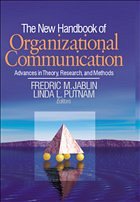Main description:
Praise for the First Edition:
`[I] recommend this book to anyone who is seriously interested in organizational communication.... It is a unique and outstanding work.... Researchers in the area will find this work extremely pertinent to their activities' - Journal of Applied Systems Analysis
The Handbook of Organizational Communication, like the original, is a landmark in the field of organizational communication. The handbook provides a more up-to-date analysis of the latest advances in this exciting field. It assists in establishing a clear identity of this discipline that has grown tremendously over the latter part of the century. The contributors, pioneers in the field, provide a more multidisciplinary perspective drawing equally from the fields of organizational behaviour, management studies and communication.
An essential resource for researchers, teachers, professionals, and advanced students in organizational communication, management, organizational behaviour, and organizational studies this handbook provides:
An historial overview of organizational communication as a discipline
More than half the chapters explore topics not included in the original handbook
Part 1 examines methodological issues as well as theoretical ones, including quantitative and qualitative research methods and language//discourse analysis.
Each chapter not only reviews and updates research in its respective area but also included discussions of research and theory from around the world.
Table of contents:
Organizational Communication - Phillip K Tompkins and Maryanne Wanca-Thibault
Prelude and Prospects
PART ONE: THEORETICAL AND METHODOLOGICAL ISSUES
Conceptual Foundations - Stanley Deetz
The Development of Key Constructs - Charles Conrad and Julie Hayes
Discourse Analysis in Organizations - Linda L Putnam and Gail T Fairhurst
Issues and Concerns
Quantitative Research Methods - Katherine Miller
Qualitative Research Methods - Bryan C Taylor and Nick Trujillo
PART TWO: CONTEXT: INTERNAL AND EXTERNAL ENVIRONMENTS
Organizational Environments and Organizational Information Processing - Kathleen M Sutcliffe
Organizational Identity - George Cheney and Lars Thoger Christensen
Linkages Between Internal and External Communication
Socio-Political Environments and Issues - Dayna Finet
Organizational Culture - Eric M Eisenberg and Patricia Riley
Globalizing Organization Communication - Cynthia Stohl
PART THREE: STRUCTURE: PATTERNS OF ORGANIZATIONAL INTERDEPENDENCE
Dualisms in Leadership Research - Gail T Fairhurst
Emergence of Communication Networks - Peter R Monge and Noshir S Contractor
Organizational Structures and Configurations - Robert D McPhee and Marshall S Poole
New Media and Organizational Structuring - Ronald E Rice and Urs E Gattiker
PART FOUR: PROCESS: COMMUNICATION BEHAVIOR IN ORGANIZATIONS
Power and Politics - Dennis K Mumby
Wired Meetings - Janet Fulk and Lori Collins-Jarvis
Technological Mediation of Organizational Gatherings
Participation and Decision Making - Davis R Seibold and B Christine Shea
Learning in Organizations - Karl E Weick and Susan J Ashford
Organizational Entry, Assimilation and Exit - Fredric M Jablin
Communication Competence - Fredric M Jablin and Patricia Sias
Praise for the First Edition:
`[I] recommend this book to anyone who is seriously interested in organizational communication.... It is a unique and outstanding work.... Researchers in the area will find this work extremely pertinent to their activities' - Journal of Applied Systems Analysis
The Handbook of Organizational Communication, like the original, is a landmark in the field of organizational communication. The handbook provides a more up-to-date analysis of the latest advances in this exciting field. It assists in establishing a clear identity of this discipline that has grown tremendously over the latter part of the century. The contributors, pioneers in the field, provide a more multidisciplinary perspective drawing equally from the fields of organizational behaviour, management studies and communication.
An essential resource for researchers, teachers, professionals, and advanced students in organizational communication, management, organizational behaviour, and organizational studies this handbook provides:
An historial overview of organizational communication as a discipline
More than half the chapters explore topics not included in the original handbook
Part 1 examines methodological issues as well as theoretical ones, including quantitative and qualitative research methods and language//discourse analysis.
Each chapter not only reviews and updates research in its respective area but also included discussions of research and theory from around the world.
Table of contents:
Organizational Communication - Phillip K Tompkins and Maryanne Wanca-Thibault
Prelude and Prospects
PART ONE: THEORETICAL AND METHODOLOGICAL ISSUES
Conceptual Foundations - Stanley Deetz
The Development of Key Constructs - Charles Conrad and Julie Hayes
Discourse Analysis in Organizations - Linda L Putnam and Gail T Fairhurst
Issues and Concerns
Quantitative Research Methods - Katherine Miller
Qualitative Research Methods - Bryan C Taylor and Nick Trujillo
PART TWO: CONTEXT: INTERNAL AND EXTERNAL ENVIRONMENTS
Organizational Environments and Organizational Information Processing - Kathleen M Sutcliffe
Organizational Identity - George Cheney and Lars Thoger Christensen
Linkages Between Internal and External Communication
Socio-Political Environments and Issues - Dayna Finet
Organizational Culture - Eric M Eisenberg and Patricia Riley
Globalizing Organization Communication - Cynthia Stohl
PART THREE: STRUCTURE: PATTERNS OF ORGANIZATIONAL INTERDEPENDENCE
Dualisms in Leadership Research - Gail T Fairhurst
Emergence of Communication Networks - Peter R Monge and Noshir S Contractor
Organizational Structures and Configurations - Robert D McPhee and Marshall S Poole
New Media and Organizational Structuring - Ronald E Rice and Urs E Gattiker
PART FOUR: PROCESS: COMMUNICATION BEHAVIOR IN ORGANIZATIONS
Power and Politics - Dennis K Mumby
Wired Meetings - Janet Fulk and Lori Collins-Jarvis
Technological Mediation of Organizational Gatherings
Participation and Decision Making - Davis R Seibold and B Christine Shea
Learning in Organizations - Karl E Weick and Susan J Ashford
Organizational Entry, Assimilation and Exit - Fredric M Jablin
Communication Competence - Fredric M Jablin and Patricia Sias

